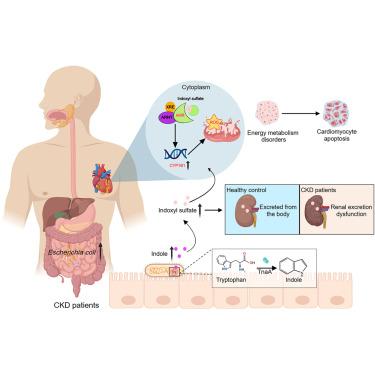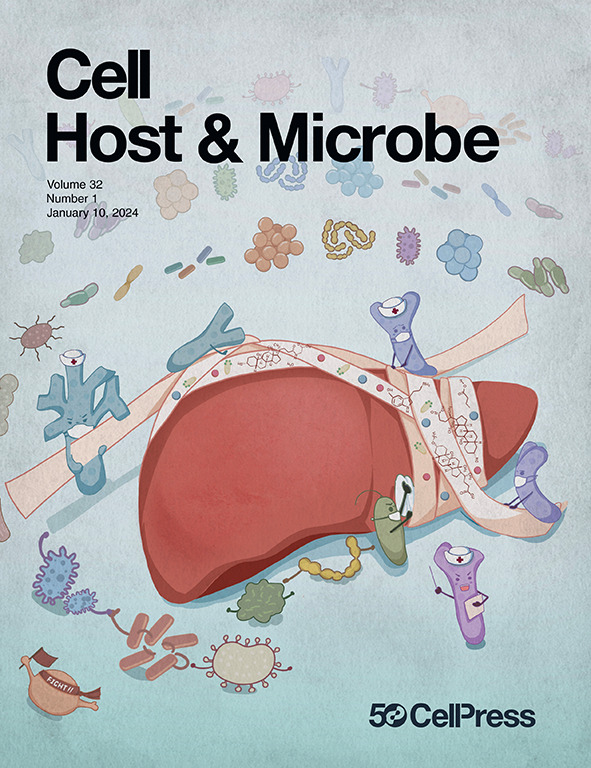肠道微生物衍生的硫酸吲哚促进慢性肾脏疾病的心力衰竭
IF 18.7
1区 医学
Q1 MICROBIOLOGY
引用次数: 0
摘要
心力衰竭(HF)在慢性肾脏疾病(CKD)中非常普遍,并与肠道微生物群的改变有关,尽管其潜在机制尚不清楚,使诊断和治疗复杂化。在这项研究中,我们发现大肠杆菌通过色氨酸酶(TnaA)途径产生的硫酸吲哚酚(IS)是参与ckd相关HF的关键代谢物。在机制上,IS破坏心脏线粒体功能,通过AHR-CYP1B1轴诱导心肌凋亡,推动HF进展。为了针对这一肠道微生物-IS轴改善CKD相关HF的临床,我们应用益生菌来降低大肠杆菌丰度和IS水平,从而改善大鼠和CKD患者的心脏结局。本研究已在中国临床试验注册中心注册(https://www.chictr.org.cn: ChiCTR2500098366和ChiCTR2500100588)。此外,在一项前瞻性CKD队列研究中,大肠杆菌丰度显示出在6个月内早期预测HF发病的诊断潜力。这些发现强调了肠道微生物群在ckd相关HF中的关键作用,并为临床干预提供了以微生物群为目标的治疗和诊断策略。本文章由计算机程序翻译,如有差异,请以英文原文为准。

Gut-microbiota-derived indole sulfate promotes heart failure in chronic kidney disease
Heart failure (HF) is highly prevalent in chronic kidney disease (CKD) and associates with alterations in gut microbiota, although the underlying mechanisms remain unclear, complicating diagnosis and treatment. In this study, we identify indoxyl sulfate (IS), produced by E. coli through the tryptophanase (TnaA) pathway, as a key metabolite involved in CKD-related HF. Mechanistically, IS disrupts cardiac mitochondrial function and induces myocardial apoptosis via the AHR-CYP1B1 axis, driving HF progression. To target this gut-microbiota-IS axis for clinical improvement of CKD-related HF, we applied probiotics to reduce E. coli abundance and IS levels, resulting in improved cardiac outcomes in rats and CKD patients. This study was registered at the Chinese Clinical Trial Register (https://www.chictr.org.cn: ChiCTR2500098366 and ChiCTR2500100588). Furthermore, E. coli abundance shows diagnostic potential for early prediction of HF onset within 6 months in a prospective CKD cohort study. These findings underscore the critical role of gut microbiota in CKD-related HF and suggest a microbiota-targeted therapeutic and diagnostic strategy for clinical intervention.
求助全文
通过发布文献求助,成功后即可免费获取论文全文。
去求助
来源期刊

Cell host & microbe
生物-微生物学
CiteScore
45.10
自引率
1.70%
发文量
201
审稿时长
4-8 weeks
期刊介绍:
Cell Host & Microbe is a scientific journal that was launched in March 2007. The journal aims to provide a platform for scientists to exchange ideas and concepts related to the study of microbes and their interaction with host organisms at a molecular, cellular, and immune level. It publishes novel findings on a wide range of microorganisms including bacteria, fungi, parasites, and viruses. The journal focuses on the interface between the microbe and its host, whether the host is a vertebrate, invertebrate, or plant, and whether the microbe is pathogenic, non-pathogenic, or commensal. The integrated study of microbes and their interactions with each other, their host, and the cellular environment they inhabit is a unifying theme of the journal. The published work in Cell Host & Microbe is expected to be of exceptional significance within its field and also of interest to researchers in other areas. In addition to primary research articles, the journal features expert analysis, commentary, and reviews on current topics of interest in the field.
 求助内容:
求助内容: 应助结果提醒方式:
应助结果提醒方式:


